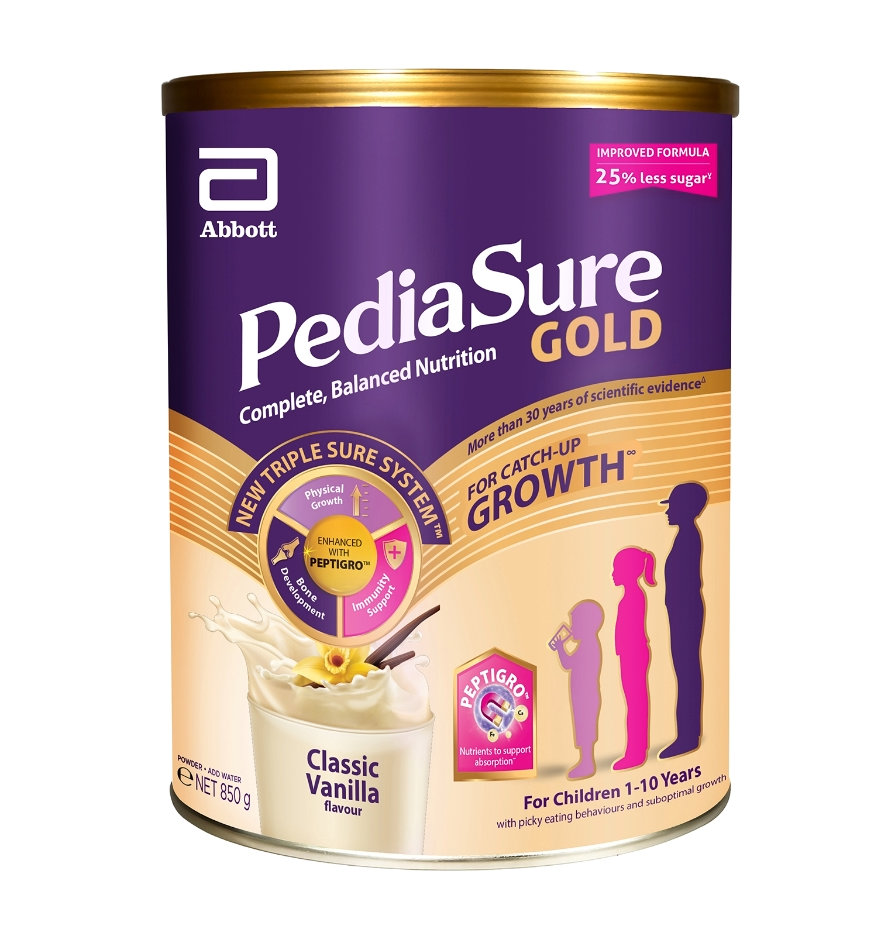Pediasure Gold
- Main Image
-

- Subtitle
- 1-10 Years Old
- Title
- PediaSure® Gold Vanilla
- Detail Page Path
Children can be susceptible to a slew of illnesses despite their vaccination status. The reason being is that their immune systems are still developing and their bodies are learning how to fight off illnesses. Furthermore, little ones are often exposed to other children with sicknesses, for example in day care centres or school. For parents, it can be stressful to look after sick children but rest assured that sicknesses are common and are part and parcel of your children’s growing up years. Ensuring that your tots are properly nourished, given adequate at-home care and preventative measures, you can look forward to healthy and happy developmental years for your children.
Hand foot and mouth disease is a common contagious viral infection that’s seen in young children and is often spread in day care centres and schools. Signs include fever, blisters on the buttocks, soles of the feet, palms, and inside of the mouth.
Home care : To care for mouth blisters, encourage the consumption of cold foods like ice cream and cold drinks and avoid strong foods that are sour, spicy, and salty. Make sure to quarantine your children as hand foot and mouth disease is contagious.
Prevention : As hand foot and mouth disease is a viral infection, proper hygiene is the most effective way of staving off the disease. Encourage your children to wash their hands regularly and avoid contact with those who might be infected.
Digestive issues can be unpleasant for both the patient and the caregiver. Diarrhoea, vomiting, and nausea are most commonly caused by food or drink contaminated with the rotavirus infection, E. coli, parasites, or salmonella. However, food allergies and intolerance can also be the culprit of digestive trouble.
Home care : It’s important to ensure your children are well hydrated as diarrhoea and vomiting can cause dehydration which can lead to more health concerns. Feeding your children bland foods like porridge or toast is easy on the digestive system. Further aid recovery by adding in over-the-counter probiotics.
Prevention: Ensure that your children practise good hygiene, such as washing their hands before meals and keeping objects out of their mouths. Make sure your children are getting clean and safe food and drink and if needed, visit your doctor for a food intolerance test.
Flu and cough are some of the most common illnesses that children can contract and they may experience the flu several times a year. Fever, chills, lethargy, body aches, sore throat, and cough can be some of the tell-tale signs of the flu. The culprit of the flu is influenza A, B, and C and it is highly contagious.
Home care : The flu needs to run its course, but you can make your children more comfortable by allowing them plenty of rest, fluids, and avoiding cold food and drink. Warm baths or hot compresses can also help with body aches.
Prevention : Adequate hygiene and a balanced diet can help keep the flu at bay. Also, don’t forget to get your children’s annual flu shot.
Fevers can be caused by various illnesses like chickenpox, flu, tonsillitis, vaccinations, and more and it is the body’s way to fight off infection. The normal temperature of children is around 36.4oC and a fever constitutes a temperature of 38oC or higher.
Home care : Make sure that your child is well hydrated as high temperatures can lead to dehydration. Check his/her temperature every few hours. Contrary to your impulse, don’t apply cold towels or cover your child in heavy blankets as this will affect the body’s natural response in fighting off illness.
Prevention : The prevention of fever is highly dependent on the underlying cause so it’s important to consult your paediatrician for advice.
Illnesses in children can often lead to loss of appetite which can affect their ability to recover. Give your children a boost by providing them with a complete and balanced oral nutrition supplement. If your child’s symptoms persist, please consult a doctor or paediatrician immediately.
SG.2022.27905.PDS.1 (v1.1)

How do you know when it’s time to worry about your fussy little one? Read on for the 101 on picky eaters.

With PediaSure® Gold being made, transported and retailed within Singapore, parents can be assured of freshness, convenience and value.

Travel with kids that are fussy eaters can seem daunting and stressful. Here are 9 tips to make your holiday fun and painless.
You are about to exit for another Abbott country or region specific website.
Please be aware that the website you have requested is intended for the residents of a particular country or region, as noted on that site. As a result, the site may contain information on pharmaceuticals, medical devices and other products or uses of those products that are not approved in other countries or regions.
The website you have requested also may not be optimized for your specific screen size.
Do you wish to continue and exit this website?